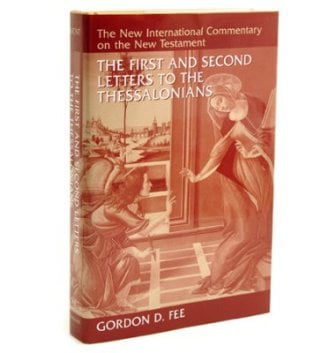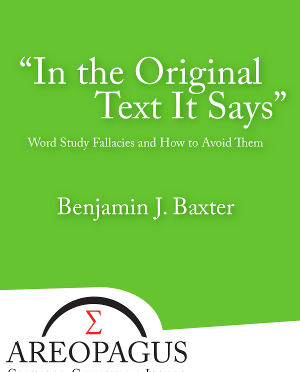[12/27/2016] 7:34 AM This morning I read 3 John as part of my “daily devotionals.” (I don’t have daily devotions, as everyone knows. There’s nothing virtuous about that statement. If you have “devotions,” more power to you. But my relationship with Christ is such that I’ve never been able to schedule a time to meet with Him. Yes, I’m a crotchety grandpa about certain things.) Here are a few takeaways in no particular order:
1) The chiastic structure of the letter. Ah yes, another “chiasmus.” There is a certain attraction to assigning the name chiasmus to just about anything we find in the New Testament. Here is the trouble: It’s too easy to impose on the text something that isn’t there. That said, I’d outline 3 John as follows:
- Introduction
- Praise for Gaius
- Condemnation of Diotrephes
- Praise for Demetrius
- Conclusion
The bull’s-eye, the central matrix, is what John has to say about Mr. “Nourished-by-God,” who wanted to be the boss of the church. More on that later.
2) How to filter the kingdom. The Christian life is more than being faithful to the truth. Gaius was that, to be sure. But John commends him for “living out the truth” — living in a manner worthy of the calling he’s received. God makes us worthy as we desire to “imitate what is good” (v. 11): meeting needs, nurturing little souls, the daily labor of parenting, etc. What keeps you from doing the truth? What changes do you need to make in 2017? Bonhoeffer, writing in prison, was on target when he said that repentance is “not in the first place thinking about one’s own needs, problems, sins, and fears, but allowing oneself to be caught up into the way of Jesus Christ” (Letters and Papers from Prison, p. 361). Good advice, if you ask me. I need to take it to heart.
3) Minimizing human leadership. Our human pedestals are such nightmares. They always backfire. Diotrephes had to be “number one.” I don’t mean to minimize the importance of pastoral leadership. But folks, our priorities are backwards. All the wrong things become too big (hierarchy, professionalism, success, size of membership) and all the right things become too small (Jesus first, humility, simplicity, everyone pulling their weight). This issue is no longer trite. It is destroying churches. When our Christian superstars fail, the church loses influence in our culture. It’s high time we humbled ourselves as Christian leaders. Ultimately, the claim of being Top Dawg predicates the rejection of Jesus’ sole lordship (Col. 1:18). It’s just that serious.
4) The passive voice. Say what? Take a look at verse 12. The idea here is “Everyone speaks well of Demetrius.” Many translations actually render the verse this way. But John actually wrote, “Demetrius is well-spoken of by everyone.” That’s the passive voice. And there’s a difference between the active and passive voices. The passive voice usually calls attention to the grammatical subject. Compare these two sentences:
- “Today, Japanese Prime Minster Abe will visit the Arizona Memorial.”
- “Today, the Arizona Memorial will be visited by Japanese Prime Minister Abe.”
See the difference? The second sentences carries a meaning like, “Today, the Arizona Memorial [of all places!] will be visited by Japanese Prime Minister Abe.” This is part and parcel of grammar. We study language, and we reap the benefits.
5) The importance of your physical health to God. Note John’s greeting in verse 2: “I hope all is well with you and that you are as healthy in body as you are strong in spirit.” Why isn’t this a reality for so many? We live with such a ridiculous “the spirit matters” but “I don’t have to care for the temple” mentality. What an insane approach to the body God has given us. I mean, we Baptists are the worst offenders. Of course, you can be a skinny person and still be a glutton. But if the number of self-deprecating potluck jokes from our pulpits means anything, we’ve got a problem, Houston. If you need to exercise, then exercise. Wrestle whatever is holding you back. You are too important to the body of Christ to lose years to heart disease and obesity. (Talk about pressure. I have to be fit to preach about presenting our bodies to God as living sacrifices?)
Well, I need to be off and running with today’s chores. Yet who can deny the importance of lying back in our lounge chair and listening to Him? Then, and only then, can we make a hard and fast connection between the brute facts of life and the reality of God. Perhaps if you and I read John’s third letter now and then, we’d find more ways to love God and people.
(From Dave Black Online. Used by permission.)



 Parts of it are truly outstanding. The translators render “Thou are my Son; today have I begotten thee” as “You are my Son; today I have become your Father.” Great so far. And then there’s this footnote on v. 8: “or, God is your kingdom.” The text of the Good News Bible, of course, reads “Your kingdom, O God, will last forever and forever!” The confusion here stems from the Greek: Is theos nominative or vocative? The translators have taken it as a vocative (correctly, in my view), but at least they note the alternative. Good for them. But here’s what puzzles me. Notice that they begin a new paragraph in verse 4.
Parts of it are truly outstanding. The translators render “Thou are my Son; today have I begotten thee” as “You are my Son; today I have become your Father.” Great so far. And then there’s this footnote on v. 8: “or, God is your kingdom.” The text of the Good News Bible, of course, reads “Your kingdom, O God, will last forever and forever!” The confusion here stems from the Greek: Is theos nominative or vocative? The translators have taken it as a vocative (correctly, in my view), but at least they note the alternative. Good for them. But here’s what puzzles me. Notice that they begin a new paragraph in verse 4. This is impossible. It contradicts the Greek text. Verses 1-4 are all one long sentence in the original. Making a new paragraph in verse 4 is just not empirically possible. It’s completely illogical — like asserting “married bachelor.” This sort of inconsistency drives me nuts. (People sometimes tell me I’m too OCD about these kinds of things but it’s part of my temperament.) I really, truly, sincerely believe we can do better. And yet, these kinds of oversights are hardly exceptional. Am I hereby trying to make a case for the study of Greek? In one sense yes. But at least you can compare other English translations before arriving at your conclusion as to the paragraph structure of a New Testament book. Again, I deeply appreciate the translators who produced the Good News Bible. When I was a teenager I literally could not put this book down. The text was readable, and the line drawings were fantastic. But our focus should always be on faithfulness to the text as the Holy Spirit inspired it — and this includes matters of syntax and structure, not just words.
This is impossible. It contradicts the Greek text. Verses 1-4 are all one long sentence in the original. Making a new paragraph in verse 4 is just not empirically possible. It’s completely illogical — like asserting “married bachelor.” This sort of inconsistency drives me nuts. (People sometimes tell me I’m too OCD about these kinds of things but it’s part of my temperament.) I really, truly, sincerely believe we can do better. And yet, these kinds of oversights are hardly exceptional. Am I hereby trying to make a case for the study of Greek? In one sense yes. But at least you can compare other English translations before arriving at your conclusion as to the paragraph structure of a New Testament book. Again, I deeply appreciate the translators who produced the Good News Bible. When I was a teenager I literally could not put this book down. The text was readable, and the line drawings were fantastic. But our focus should always be on faithfulness to the text as the Holy Spirit inspired it — and this includes matters of syntax and structure, not just words.

